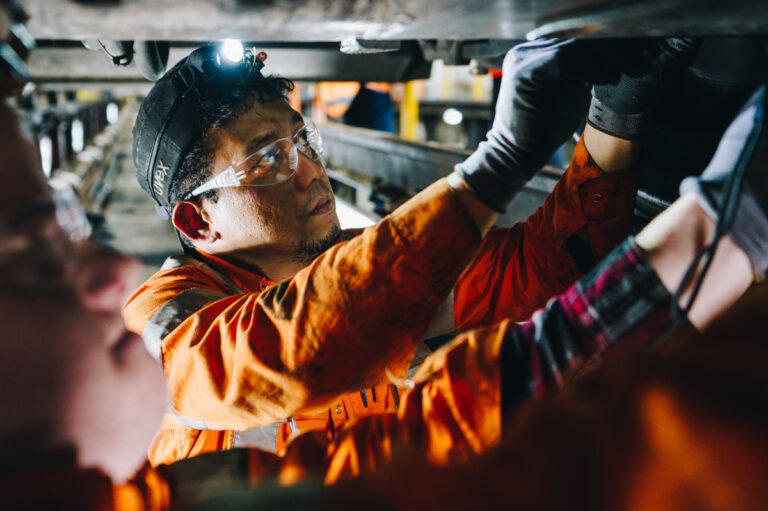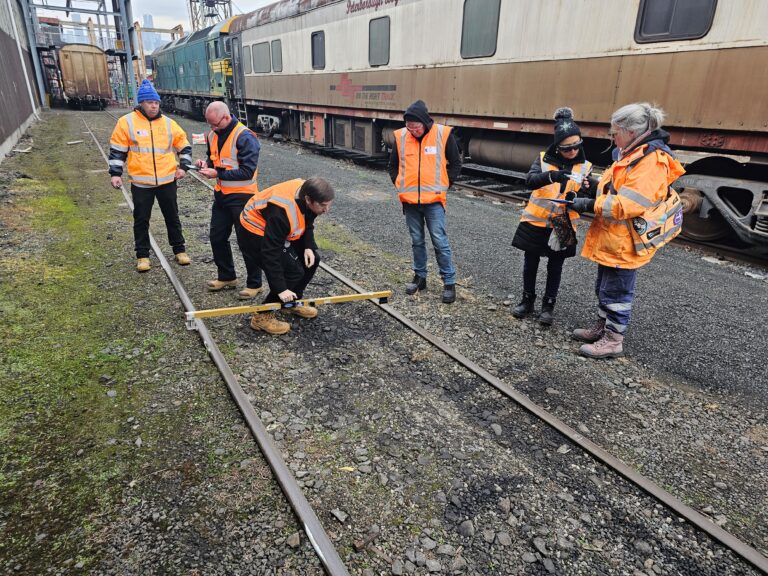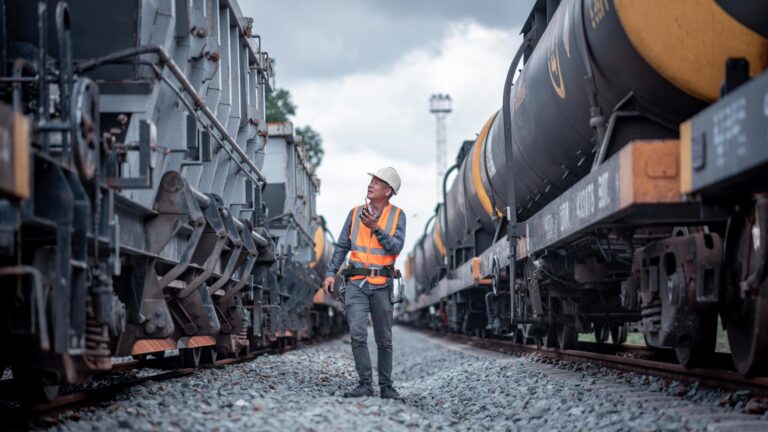How to become a rail industry worker?
The Australian rail industry is the backbone of the country’s transportation infrastructure. It encompasses an extensive network of railways that crisscross the nation, serving as the lifeblood of freight and passenger transport. Rail industry workers are the skilled professionals responsible for keeping this network in top-notch condition.
In the vast expanse of Australia’s railway network, a career as a rail worker offers unique opportunities to visit parts of Australia often missed by other modes of transport and the chance to play an integral role in keeping the country’s railroads operating smoothly.
Whether you’re a newcomer to the industry or seeking a change in your career path, this article will walk you through different ways to enter the rail industry network and obtain your Rail Industry Workers (RIW) card.
What is a rail industry worker?
A rail industry worker is an individual who undertakes various roles within the rail sector. These roles encompass a wide range of responsibilities, including track maintenance, signalling, engineering, train drivers, building bridges and tunnels, laying new railway tracks, maintaining diesel engines and various other positions such as in customer service, training, finance and business development that equally contribute to the efficient operation of the rail network.
Opportunities in rail have never been more promising, with $155 billion slated for rail investments in the coming decade.
New and experienced rail workers can get a chance to participate in groundbreaking projects like Brisbane’s Cross River Rail and Auckland City Link or contribute to the transformative Inland Rail project to boost Australia’s freight networks.
Why join the rail industry?
Supporting Sustainable Transportation
The rail industry plays a pivotal role in our nation’s transportation system, contributing significantly to the sustainable development of our cities and towns. Embracing rail transport helps reduce the number of cars and trucks on our roads, reduces emissions and promotes healthier communities. By working in rail, you are at the forefront of actively contributing to a more sustainable future for your local community and beyond.
Engaging in Cutting-Edge Projects
The global rail technology market boasts an impressive worth of $362 billion, and its growth shows no signs of slowing down. Rail operators continually upgrade their networks, creating opportunities for innovation and advancement within the industry. Your involvement can be a driving force in shaping the future of rail technology, ensuring it aligns with the evolving needs of our society.
Competitive Wages and Career Advancement
The industry allows professionals to move between various roles and specialisations, providing a dynamic and fulfilling career with enduring prospects. By choosing to work in the industry, you invest in a long-term, rewarding career journey.
How to start a career in the rail industry?
Apprenticeships
The most common route to gain hands-on experience and knowledge in rail involves an apprenticeship. It typically takes three to four years to complete, during which you earn while you learn and ultimately receive a nationally recognised qualification.
Tertiary Study, Cadetships, and Graduate Positions
If you’re an undergraduate student looking for hands-on experience, internships will offer practical exposure to your academic studies. It is a great way to gain insights into the industry, develop skills, and expand your professional network. Internships usually last from one to three months.
Graduate Programs offer specialised rail training, mentoring, and networking opportunities. They usually run for one to three years and provide a well-rounded experience by involving you in various departments.
Available to students or recent graduates of engineering programs, cadetships help transition academic knowledge into a career in rail engineering. They are part-time and typically last from one to three years.
Trainees and Work Experience
Traineeships offer practical experience in supporting roles while earning and learning new skills. Traineeships can vary from six months to two years, often leading to nationally recognised qualifications.
Work experience placements while in school can also be beneficial in connecting with potential employers.
Transition from Another Industry
Experienced professionals from industries like information technology, infrastructure, transport, construction, logistics, and mining can easily find opportunities in the industry. Many rail employers are open to candidates with relevant qualifications and will provide additional training or bridging qualifications to help you succeed in your new role.
Getting started in the industry begins with the proper training and qualifications. The Skills First Program with CERT equips aspiring rail industry workers with the necessary skills and knowledge to enter the field confidently.
You can find out more about Apprenticeships and Traineeship opportunities in rail here: Trainees & Apprentices – Connect Talent.
The Skills First Program with CERT
Available through CERT Training, The Skills First program offers rail businesses the opportunity to receive high-quality accredited rail training delivered with Victorian and Commonwealth Government funding.
Funding for eligible trainees on the TLI27121- Certificate II in Rail Infrastructure is available.
Learn more about the Skills First Program here.
What do you need to work on the railway in Australia?
You will need the following accreditations as a minimum requirement to work on Australia’s major private or public railway systems.
- Prepare to work safely in the construction industry (White Card)
- Medical Assessments
- Safely Access the Rail Corridor (RIW card)
Depending on your prospective employer’s needs and requirements, you must satisfy all these to receive your RIW card.
Read more about how to get a railway job here.
How do I get my RIW card?
A RIW Card is a paid identification card that includes a link to an electronic record of a worker’s details as relevant to their work on a rail network.
The Safely Access the Rail Corridor course is a prerequisite for acquiring the RIW card, as required by numerous rail network providers, including but not limited to the Australian Rail Track Corporation (ARTC), Aurizon, John Holland, and DPTI (SA).
Other state rail authorities may not require this course completion, but they may have additional safety requirements for employment.
You can monitor your RIW profile when you log in to myRIW and view your current and expiring competencies, health assessments status, your site access history and your approved companies that can view or manage your profile.
The validity period of the RIW card is five years from the issue date. You must renew your RIW card before it expires to avoid work-related disruptions.
Be aware there is a current job scam involving RIW cards where people seeking jobs are being told to pay an invoice to receive their RIW card for a job. To get your RIW card you need to apply directly through the RIW website or, your employer can request it for you.
What is a RIW program?
The information on the RIW card comes from the worker’s electronic record kept within the Australian Railway Association (ARA) database.
The Rail Industry Worker program is Australia’s centralised system for managing the competencies and accreditation of workers requiring rail corridor access for their job roles.
This program’s primary objective is to establish a unified national competency management system that facilitates participant rail organisations in monitoring a worker’s job roles, competencies, work history, and employers.
This aids in ensuring compliance with regulatory requirements and adherence to Rail Safety National Law, effectively guaranteeing that only qualified workers are hired for rail-related positions.
Where can I find rail jobs around Australia?
Australia’s vast rail network offers numerous job opportunities in various regions. Major cities and regional hubs often have rail-related openings.
To explore job opportunities in rail, you can check company websites for job listings and consult with agencies specialising in rail placements to keep an eye out for vacancies in your chosen field and location.
We’ve compiled a list of the best places in each state to begin your job search for a rail job in Australia here.
To enquire about CERT’s rail training courses, contact us on 1300 042 3780 or click your state below to pick the right training for you:
Enrol in CERT Training now and start your career in rail today.
To stay updated about the industry practices, key safety information and best practices, follow us on our social media: Facebook and LinkedIn.
-
How to Become Certified for NSW Rail Jobs
In an increasingly unstable job market, one sector continues to thrive: the rail transportation industry. So, are you interested in getting certified for one…
-
RISSB Derailment Investigation and Analysis Workshop
Investigating a derailment is a complex process. Investigations must be conducted in a structured and thorough manner to correctly identify the causes of derailment…
-
10 Ways Railway Training Can Boost Your Career
With the right training and development, you can gain the skills and knowledge you need to advance your career in rail and take advantage of new job opportunities.



